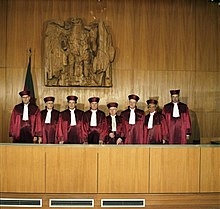| Revision as of 13:26, 29 March 2012 editPajz (talk | contribs)Extended confirmed users, Rollbackers4,712 editsm →Democratic function: that's pure speculation← Previous edit | Revision as of 15:34, 29 March 2012 edit undoArcticocean (talk | contribs)Edit filter managers, Extended confirmed users46,264 edits Undid revision 484535804 by Pill (talk) that "speculation" is the view of the source given immediately after the statement...Next edit → | ||
| Line 75: | Line 75: | ||
| {{Rquote|right| court is an important institution for the protection of minority interests<ref>''Government and Politics of West Germany'', p. 165</ref>}} | {{Rquote|right| court is an important institution for the protection of minority interests<ref>''Government and Politics of West Germany'', p. 165</ref>}} | ||
| The Constitutional Court is able to actively administer the law and ensure that political and bureaucratic decisions comply with the rights of the individual enshrined in the Basic Law. Specifically, it can vet the democratic and constitutional legitimacy of bills proposed by federal or state government, scrutinise decisions (such as those relating to taxation) by the administration, arbitrate disputes over the implementation of law between states and the federal government, and (most controversially) ban non-democratic political parties.<ref>Kesselman et al. (2009), ch. 4 p. 69</ref> The Constitutional Court enjoys more public trust than does the federal or state parliaments, which |
The Constitutional Court is able to actively administer the law and ensure that political and bureaucratic decisions comply with the rights of the individual enshrined in the Basic Law. Specifically, it can vet the democratic and constitutional legitimacy of bills proposed by federal or state government, scrutinise decisions (such as those relating to taxation) by the administration, arbitrate disputes over the implementation of law between states and the federal government, and (most controversially) ban non-democratic political parties.<ref>Kesselman et al. (2009), ch. 4 p. 69</ref> The Constitutional Court enjoys more public trust than does the federal or state parliaments, which derives from the German enthusiasm for the rule of law.<ref>{{Citation| title = Germany's Constitutional Court: Judgment days| newspaper = The Economist| location = Karlsruhe| date = 26 May 2009| url = http://www.economist.com/node/13376204| archiveurl = http://www.webcitation.org/66DOaKfY0| archivedate =2012-03-16 | ||
| }}</ref> | }}</ref> | ||
Revision as of 15:34, 29 March 2012
| Federal Constitutional Court of Germany | |
|---|---|
 | |
| 38°53′27″N 77°00′16″W / 38.890708°N 77.004344°W / 38.890708; -77.004344 | |
| Established | 1951 |
| Location | Karlsruhe, Germany |
| Coordinates | 38°53′27″N 77°00′16″W / 38.890708°N 77.004344°W / 38.890708; -77.004344 |
| Composition method | Bundestag (Lower House) or Bundestrat (Upper House) appointment |
| Authorised by | Basic Law or Grundgesetz (constitution) |
| Judge term length | 12-year term with mandatory retirement at 68 |
| Number of positions | 16, halved into two senates |
| Website | bundesverfassungsgericht.de (en) |
| President of the Court | |
| Currently | Andreas Voßkuhle |
| Since | March 2010 |

| This article is part of a series on the |
| Politics of Germany |
|---|
 |
| Constitution (Basic Law) |
| Head of State |
|
Executive
|
|
Legislature
|
Judiciary
|
|
Subdivisions
|
Elections
|
State and local politics
|
Foreign relations
|
|
Political ideologies
|
The Federal Constitutional Court (German: Bundesverfassungsgericht, or BVerfG) is a supreme constitutional court established by the constitution or Basic Law of Germany. Since its inception with the beginning of the Federal Republic of Germany, the court has been located in the city of Karlsruhe—intentionally distanced from the other federal institutions in Berlin (earlier in Bonn), Munich, and Frankfurt.
The sole task of the court is judicial review, and it may declare legislation unconstitutional, thus rendering them ineffective. In this respect, it is similar to other supreme courts with judicial review powers, like the Supreme Court of the United States; yet the Court possesses a number of additional powers, and is regarded as among the most interventionist and powerful national courts in the world. Unlike other supreme courts, the constitutional court is not an integral stage of the judicial or appeals process (aside from in cases concerning constitutional or public international law), and does not serve as a regular appellate court from lower courts or the Federal Supreme Courts on any violation of federal laws.
The court's jurisdiction is focused on constitutional issues and the compliance of all governmental institution with the constitution. Constitutional amendments or changes passed by the Parliament are subject to its judicial review, since they have to be compatible with the most basic principles of the Grundgesetz (per the 'eternity clause').
The court's practice of enormous constitutional control frequency on the one hand, and the continuity in judicial restraint and political revision on the other hand, have created a unique defender of the Grundgesetz since World War II and given it a valuable role in Germany's modern democracy.
Scope
In Art. 20 s. 3 of the Basic Law, it is stipulated that all three branches of the state (the legislature, executive, and judiciary) are bound directly by the constitution. As a result, the court can rule acts of any branches unconstitutional, whether for formal violations (exceeding powers or violating procedures) or for material conflicts (when the civil rights prescribed in the Grundgesetz are not respected).
The powers of the Federal Constitutional Court are defined in article 93 of the Grundgesetz. This constitutional norm is concertized by a federal law, the Federal Constitutional Court Act (BVerfGG). This federal law also defines how decisions of the court on material conflicts are put into force. The Constitutional Court has therefore several strictly defined procedures in which cases may be brought before it:
- Constitutional complaint: By means of the Verfassungsbeschwerde ("constitutional complaint") any person may allege that his or her constitutional rights have been violated. Although only a small fraction of these are actually successful (ranging around 2.5 % since 1951), several have resulted in major legislation being invalidated, especially in the field of taxation. The large majority of the court's procedures fall into this category; 135,968 such complaints were filed from 1957 to 2002.
- Abstract regulation control: Several political institutions, including the governments of the Bundesländer (states), may bring a federal law before the court if they consider it unconstitutional. A well known example of this procedure was the 1975 abortion decision, which invalidated legislation intended to decriminalise abortion.
- Specific regulation control: Any regular court which is convinced, that a law in question for a certain case is not in conformance with the constitution must suspend that case and bring this law before the Federal Constitutional Court.
- Federal dispute: Federal institutions, including members of the Bundestag, may bring internal disputes over competences and procedures before the court.
- State-federal dispute: The Länder may bring disputes over competences and procedures between the states and federal institutions before the court.
- Investigation committee control
- Federal election scrutiny: Violations of election laws may be brought before the court by political institution or any involved voter.
- Impeachment procedure: Impeachment proceedings may be brought against the Federal President, a judge, or a member of one of the Federal Supreme Courts, by the Bundestag, the Bundesrat or the federal government, based on violation of constitutional or federal law.
- Prohibition of a political party: Only the Constitutional Court has the power to ban a political party in Germany. This has happened just twice, both times in the 1950s: the Socialist Reich Party (SRP), a neo-Nazi group, was banned in 1952, and the Communist Party of Germany (KPD) was banned in 1956. A third such procedure to prohibit the far-right National Democratic Party of Germany (NPD) failed in 2003 after the court discovered that many of the party officials were in fact controlled by the German secret services that had injected its agents for the sake of surveillance. This was a 4-4 decision, which according to the court's rules is considered a dismissal. The court did not decide on the ban itself.
Germany's Constitutional Court has been quite active, striking down more than 600 laws because they were found unconstitutional (as of 2009).
Organisation
The Court consists of two Senates, each of which has eight members, headed by a senate’s chairman. The members of each Senate are allocated to three Chambers for hearings in Constitutional Complaint and Single Regulation Control cases. Each Chamber consists of three judges, so each Senate chairman is at the same time a member of two Chambers.
Decisions by a Senate require an absolute majority. In some cases a two thirds majority is required (§ 15 IV 1 BVerfGG). Decisions by a Chamber need to be unanimous. A Chamber is not authorized to overrule a standing precedent of the Senate to which it belongs; such issues need to be submitted to the Senate as a whole. Similarly, a Senate may not overrule a standing precedent of the other Senate, and such issues will be submitted to a plenary meeting of all 16 judges (the "Plenum").
Unlike all other German courts, the court often publishes the vote count on its decisions (though only the final tally, not every judge's personal vote) and even allows its members to issue a dissenting opinion. This possibility, introduced only in 1971, is a remarkable deviation from German judicial tradition.
One of the two Senate Chairmen is also the President of the Court, the other one being the Vice-President. The presidency alternates between the two Senates, i.e. the successor of a President is always chosen from the other Senate. The current president of the Court is Andreas Voßkuhle.
Democratic function
court is an important institution for the protection of minority interests
The Constitutional Court is able to actively administer the law and ensure that political and bureaucratic decisions comply with the rights of the individual enshrined in the Basic Law. Specifically, it can vet the democratic and constitutional legitimacy of bills proposed by federal or state government, scrutinise decisions (such as those relating to taxation) by the administration, arbitrate disputes over the implementation of law between states and the federal government, and (most controversially) ban non-democratic political parties. The Constitutional Court enjoys more public trust than does the federal or state parliaments, which derives from the German enthusiasm for the rule of law.
Appointment of judges
The Court's judges are elected by the Bundestag and the Bundesrat. According to the Basic Law, each of these bodies selects four members of each Senate, while the authority to select the Court's President alternates between them. The selection of a judge requires a two-thirds majority.
The Bundestag has delegated this task to a special body ("Richterwahlausschuss", judges election board), consisting of a small number of Bundestag members. This procedure has caused some constitutional concern and is considered to be unconstitutional by many scholars. However, it has never been challenged in a court.
The judges are elected for a 12-year term, but they must retire upon reaching the age of 68. A judge must be at least 40 years old and must be a well-trained jurist. Three out of eight members of each Senate have served as a judge on one of the federal courts. Of the other five members of each Senate, most judges previously served as an academic jurist at a university, as a public servant or as a lawyer. After ending their term, most judges withdraw themselves from public life. However, there are some prominent exceptions, most notably Roman Herzog, who was elected Federal President in 1994, shortly before the end of his term as President of the Court.
Appointment mechanism


Current members
| Name | Term | Nomination by | Election by |
|---|---|---|---|
| First Senate | |||
| Ferdinand Kirchhof (*1950) (Vice-President of the Court, Chairman of the First Senate) |
10/2007 - 6/2018 (retirement) | CDU/CSU | Bundestag |
| Wilhelm Schluckebier (*1949) | 10/2006 - 11/2017 (retirement) | CDU/CSU | Bundestag |
| Michael Eichberger (*1953) | 4/2006 - 4/2018 (12-year-term) | CDU/CSU | Bundesrat |
| Gabriele Britz (*1968) | 2/2011 - 2/2023 (12-year term) | SPD | Bundesrat |
| Johannes Masing (*1959) | 4/2008 - 4/2020 (12-year term) | SPD | Bundesrat |
| Susanne Baer (*1964) | 2/2011 - 2/2023 (12-year term) | Alliance '90/The Greens | Bundestag |
| Reinhard Gaier (*1954) | 11/2004 - 11/2016 (retirement) | SPD | Bundesrat |
| Andreas L. Paulus (*1968) | 03/2010 - 03/2022 (12-year term) | FDP | Bundestag |
| Second Senate | |||
| Andreas Voßkuhle (*1963) (President of the Court, Chairman of the Second Senate) |
5/2008 - 5/2020 (12-year term) | SPD | Bundesrat |
| Peter M. Huber (*1959) | 10/2010 - 10/2022 (12-year term) | CDU/CSU | Bundestag |
| Monika Hermanns (* 1959) | 11/2010 - 11/2022 (12-year term) | SPD | Bundestag |
| Sibylle Kessal-Wulf (*1958) | 12/2011 - 12/2023 (12-year term) | CDU/CSU | Bundesrat |
| Peter Müller (*1955) | 12/2011 - 12/2023 (12-year term) | CDU/CSU | Bundesrat |
| Gertrude Lübbe-Wolff (*1953) | 4/2002 - 4/2014 (12-year term) | SPD | Bundestag |
| Michael Gerhardt (*1948) | 7/2003 - 7/2015 (12-year term) | SPD | Bundestag |
| Herbert Landau (*1948) | 10/2005 - 4/2016 (retirement) | CDU/CSU | Bundesrat |
Presidents of the Court
Previous judges
- Susanne Baer
- Ernst Benda
- Ernst-Wolfgang Böckenförde
- Werner Böhmer
- Gabriele Britz
- Siegfried Broß
- Hans Brox
- Brun-Otto Bryde
- Udo Di Fabio
- Thomas Dieterich
- Michael Eichberger
- Wilhelm Ellinghaus
- Hans Joachim Faller
- Reinhard Gaier
- Michael Gerhardt
- Karin Graßhof
- Dieter Grimm
- Karl Haager
- Evelyn Haas
- Winfried Hassemer
- Johann Friedrich Henschel
- Monika Hermanns
- Roman Herzog
- Konrad Hesse
- Martin Hirsch
- Dieter Hömig
- Hermann Höpker-Aschoff
- Christine Hohmann-Dennhardt
- Wolfgang Hoffmann-Riem
- Peter M. Huber
- Renate Jaeger
- Hans-Joachim Jentsch
- Rudolf Katz
- Dietrich Katzenstein
- Sibylle Kessal-Wulf
- Ferdinand Kirchhof
- Paul Kirchhof
- Hans Hugo Klein
- Konrad Kruis
- Jürgen Kühling
- Herbert Landau
- Gerhard Leibholz
- Jutta Limbach
- Gertrude Lübbe-Wolff
- Ernst Gottfried Mahrenholz
- Johannes Masing
- Rudolf Mellinghoff
- Gebhard Müller
- Peter Müller
- Engelbert Niebler
- Gisela Niemeyer
- Lerke Osterloh
- Hans-Jürgen Papier
- Andreas L. Paulus
- Theodor Ritterspach
- Joachim Rottmann
- Wiltraut Rupp-von Brünneck
- Erna Scheffler
- Fabian von Schlabrendorff
- Wilhelm Schluckebier
- Helga Seibert
- Otto Seidl
- Walter Seuffert
- Alfred Söllner
- Bertold Sommer
- Helmut Steinberger
- Udo Steiner
- Ernst Träger
- Friedrich Wilhelm Wagner
- Klaus Winter
- Wolfgang Zeidler
Further reading
- the Court's website (with link in English language)
- Federal Constitutional Court Act (BVerfGG) Template:De icon
- Federal Constitutional Court Act (BVerfGG) Template:En icon
Notes
- Art. 79 s. III
References
- http://www.bundesverfassungsgericht.de/en/library.html Reference to The Federal Constitutional Court's Webpage saying that its establishment was in 1951
- "Art. 93" (PDF). Basic Law for the Federal Republic of Germany (in English Translation (originally German)). Berlin: German Bundestag. 2010 (As at: April 2010). pp. 82–83. Retrieved
19 August 2010.{{cite web}}: Check date values in:|accessdate=and|year=(help); Cite has empty unknown parameter:|separator=(help); Unknown parameter|trans_title=ignored (|trans-title=suggested) (help)CS1 maint: unrecognized language (link) CS1 maint: year (link) - Law, David S., The Anatomy of a Conservative Court in Texas Law Review lxxxvii: 1545–1593
- Government and Politics of West Germany, p. 165
- Kesselman et al. (2009), ch. 4 p. 69
- "Germany's Constitutional Court: Judgment days", The Economist, Karlsruhe, 26 May 2009, archived from the original on 2012-03-16
Bibliography
- Allen, Christopher S. (10 February 2009). "Chapter 4: Germany". In Kesselman, Mark; Krieger, Joel; Joseph, William A (eds.). Introduction to Comparative Politics. Wadsworth. ISBN 0-495-79741-3.
- Law, David S. (2009). "The Anatomy of a Conservative Court: Judicial Review in Japan". Texas Law Review. 87: 1545–1593.
- "Judgment Days: Germany's Constitutional Court". The Economist. 28 March 2009.
- Lenaerts, Koen; Gutman, Kathleen. "'Federal Common Law' in the European Union: A Comparative Perspective from the United States". The American Journal of Comparative Law. 54: 1–121.
- Pruezel-Thomas. "The abortion issue and the federal constitutional court". German Politics. 2:3.
- Johnson. "The federal constitutional court: Facing up to the strains of law and politics in the new Germany". German Politics. 3:3.
| Supreme Courts of Europe | |
|---|---|
| Sovereign states |
|
| States with limited recognition | |
| Judiciary of Germany | ||
|---|---|---|
| Constitutional Court | ||
| Supreme Courts | ||
| Collaborations of Supreme Courts | ||